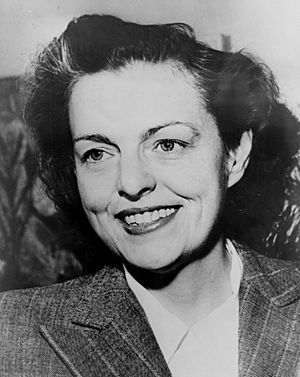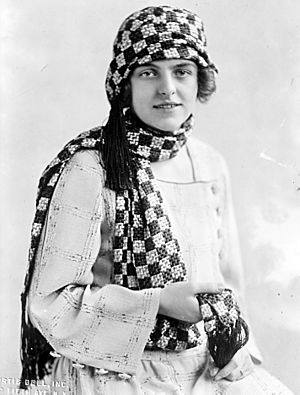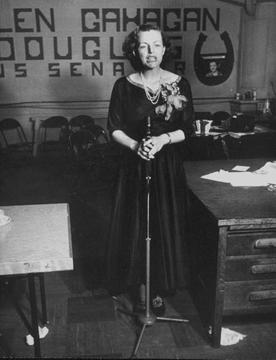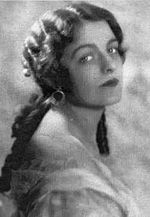Helen Gahagan Douglas facts for kids
Quick facts for kids
Helen Gahagan Douglas
|
|
|---|---|

Gahagan Douglas, c. 1945
|
|
| Member of the U.S. House of Representatives from California's 14th district |
|
| In office January 3, 1945 – January 3, 1951 |
|
| Preceded by | Thomas F. Ford |
| Succeeded by | Sam Yorty |
| Personal details | |
| Born |
Helen Mary Gahagan
November 25, 1900 Boonton, New Jersey, U.S. |
| Died | June 28, 1980 (aged 79) New York City, U.S. |
| Political party | Democratic |
| Spouse | |
| Children | 2 |
| Parents |
|
| Alma mater | Barnard College |
| Occupation |
|
Helen Gahagan Douglas (born Helen Mary Gahagan; November 25, 1900 – June 28, 1980) was a talented American actress and a powerful politician. She achieved fame on Broadway, as a touring opera singer, and in Hollywood films. Her role as the villain in the 1935 film She even inspired the Evil Queen in Disney's Snow White and the Seven Dwarfs. Later, she became a member of the United States Congress, fighting for important causes.
Contents
Helen Gahagan Douglas's Early Years
Helen Mary Gahagan was born in Boonton, New Jersey, on November 25, 1900. Her father, Walter H. Gahagan, was an engineer with his own construction business. Her mother, Lillian Rose Mussen, had been a schoolteacher. Helen grew up in an upper-middle-class neighborhood in Brooklyn, New York.
She attended the prestigious Berkeley Carroll School, where her performances in school plays caught the eye of critics. Helen wanted to become an actress, but her father didn't think it was a suitable job for a woman. After an argument, she was sent to study at the Capen School for Girls in Massachusetts.
Helen later got into Barnard College, part of Columbia University. However, after two years, she decided to leave college without finishing her degree. She chose to follow her dream of becoming an actress instead.
Becoming a Star: Helen's Acting Career
In the 1920s, Helen Gahagan became a very successful and well-known star on Broadway. She appeared in popular plays such as Young Woodley.
At 26, Helen decided to try a new career as an opera singer. After two years of voice lessons, she toured Europe and received great reviews. This was quite unusual for an American singer at that time.
In 1930, she returned to Broadway to star in Tonight or Never. Here, she met and co-starred with actor Melvyn Douglas. They married in 1931. Helen kept her maiden name, Gahagan. They had two children, Peter and Mary.
In 1935, Helen Gahagan Douglas went to Hollywood. She starred in the movie She, playing Hash-a-Motep, the queen of a lost city. This movie is famous for popularizing the phrase "She who must be obeyed." Helen's portrayal of the "ageless ice goddess" helped inspire the Evil Queen in Walt Disney's Snow White and the Seven Dwarfs.
In 1938, while performing opera in Vienna, Helen had an upsetting experience with a Nazi supporter. This made her determined to speak out against Nazism. She immediately flew back to Los Angeles to join the fight.
Helen's Journey into Politics
Helen Gahagan Douglas became interested in politics through her husband. She joined the Democratic Party shortly after Franklin D. Roosevelt became president in 1932. The Roosevelt family and the Douglas family became close friends, and First Lady Eleanor Roosevelt became a political guide for Helen.
Helen didn't really like the Hollywood lifestyle. After her daughter Mary Helen was born in 1938, she started learning about the struggles of migrant workers. She became more and more aware of political issues. Soon, she became a leader for groups helping migrants. By 1940, she was a national spokesperson for these workers.
Important Roles and Activities
The Douglases joined the Hollywood Anti-Nazi League. In 1939, they encouraged the United States to stop buying goods from Nazi Germany.
Helen Gahagan Douglas served on several important committees. She was part of the national advisory committee for the Works Progress Administration and the State committee for the National Youth Administration from 1939 to 1940. She also became a leader in the Democratic Party for California's women's division. President Roosevelt appointed her to the Voluntary Participation Committee, which helped with civilian defense. Later, President Harry S. Truman appointed her as a delegate to the United Nations Assembly.
In 1946, she was honored by the National Association of Colored Women. They recognized her work in helping different races and genders work together for equality. Helen had worked with Mary McLeod Bethune, the founder of this organization.
Serving in Congress
In 1943, Democratic leaders, including President Roosevelt, convinced Helen Gahagan Douglas to run for a seat in the U.S. House of Representatives. To appeal to more voters, she started using her husband's last name, Douglas. She gave an impressive speech at the 1944 Democratic National Convention, which made many people think she might even become Vice President someday.
In the fall elections, Helen Gahagan Douglas won the House race. She then won two more terms, serving in Congress from January 1945 to January 1951.
During her time in the House, she supported many important causes. These included civil rights, helping migrant workers, women's issues, affordable housing, fair taxes, and reducing nuclear weapons. She even proposed a bill to stop lynching, despite strong opposition. She also supported a plan to create a large national forest to protect California redwood trees.
The 1950 Senate Campaign
In 1950, Helen Gahagan Douglas decided to run for the United States Senate. Another Democrat, Sheridan Downey, was already in the race, but he later dropped out. Helen then won the Democratic nomination against another candidate, Manchester Boddy. After she won, Downey supported the Republican candidate, U.S. Representative Richard M. Nixon.
The campaign between Helen Gahagan Douglas and Richard Nixon became known as one of the toughest in California's political history. During the primary election, her opponent, Boddy, had tried to make her seem like she supported communism. Nixon's campaign then used similar tactics. They printed many flyers on pink paper, suggesting she was too liberal or had communist sympathies.
Helen Gahagan Douglas, in turn, gave Nixon a nickname that became very famous: "Tricky Dick".
Nixon won the election by a significant margin. This ended Helen Gahagan Douglas's career in Congress. However, she continued to be an activist, working for many years to control nuclear weapons.
Helen Gahagan Douglas later said that Nixon's harsh campaign methods were not needed. She believed she might have lost anyway because many young, Republican voters felt a stronger connection to Nixon. Also, a lot of money from oil companies supported Nixon's campaign.
Helen's Life After Congress
After leaving Congress, Helen Gahagan Douglas returned to acting in 1952. She also actively campaigned for John F. Kennedy, who successfully ran against Richard Nixon in the 1960 presidential election.
She was even mentioned in a 1965 song by satirist Tom Lehrer, which talked about Hollywood stars getting into politics.
President Lyndon B. Johnson appointed Helen Gahagan Douglas as a "Special Ambassador" for a presidential inauguration in Liberia. However, she later spoke out against the Vietnam War, which caused a disagreement with Johnson. She also campaigned against Nixon's re-election in 1972 and called for his removal from office during the Watergate scandal.
During and after the Watergate scandal, bumper stickers appeared in California that said, "Don't blame me, I voted for Helen Gahagan Douglas." This showed that many people remembered her and her political views. In October 1973, she was one of the first women featured on the cover of Ms. magazine.
In 1979, Barnard College gave Helen Gahagan Douglas its highest honor, the Barnard Medal of Distinction. She passed away the following year, on June 28, 1980, from breast and lung cancer, with her husband Melvyn by her side.
Helen Gahagan Douglas's Legacy
Senator Alan Cranston of California spoke highly of Helen Gahagan Douglas in 1980. He said she was "one of the grandest, most eloquent, deepest-thinking people we have had in American politics." He believed she was among the best 20th-century leaders, comparing her to Eleanor Roosevelt.
A collection of Helen Gahagan Douglas's papers, covering her life and career, is kept at the Carl Albert Center.
See also
 In Spanish: Helen Gahagan Douglas para niños
In Spanish: Helen Gahagan Douglas para niños
- Women in the United States House of Representatives
 | Selma Burke |
 | Pauline Powell Burns |
 | Frederick J. Brown |
 | Robert Blackburn |




